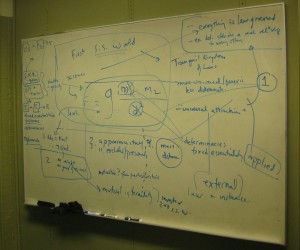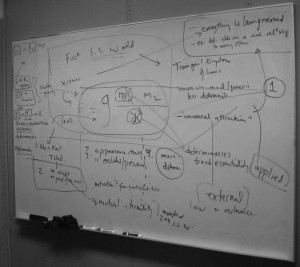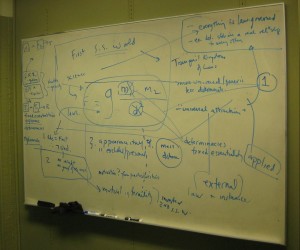 When we undertake the study of something, we typically approach the subject-matter in a very circumscribed way.
When we undertake the study of something, we typically approach the subject-matter in a very circumscribed way.
There already exists a very well-defined discipline of engineering or archaeology or management or kinesiology, and each such subject studied thus presents itself as an already complete, independently defined object. The existence of the discipline, in other words, suggests to us that the subject-matter is “real,” and we then turn to the already well-developed disciplinary norms, methods and already-established results to comprehend that object. What is concealed in this process, and what we often forget, is that all these established domains of inquiry have their root in the human practices of investigation that initially gave rise to them. Those “sciences” exist, in other words, because their subject-matters mattered to people.
We take up our studies in a circumscribed way, in that we cut them away from their existential context: we do not understood how our subject-matter arose in response to the specific concerns that specific people had. To study well will not simply be to learn the “objective features” of our subject-matters, but to learn–and to grapple with–the human purpose behind (and in) their study.
 Here, as in so many places, the ancient
Here, as in so many places, the ancient  Athenian philosopher Socrates remains one of our most insightful guides–and one of our most unrelenting critics. In Book VI of Plato’s Republic, (509d-513e), Socrates proposes to Plato’s brother Glaucon that we imagine knowledge to be like a divided line. As we move upwards along the line in our developing knowledge, the object of our study becomes clearer and we understand better what we are doing in that study. It is a significant advance to move from noticing a dark spot on the ground to recognizing that it is a shadow, that is, recognizing that the dark appearance is caused by the body whose shadow it is. It is a significant further advance to move from noticing that body to recognizing that it is itself a phenomenon–a reality dependent for its existence on the deeper, causal forces that shape reality as such, and that reveal themselves through such bodies. 2000 years later (in the first of his Meditations on First Philosophy of 1641) René Descartes made the same point: “what is in front of us” is recognized more clearly when we recognize things appearing, rather than just sensations, and more clearly again when we recognize universal principles of nature appearing, rather than just things. Both Socrates and Descartes thus defend the importance of science–the importance of understanding reality in terms of its causes. Both Socrates and Descartes, however, push us one step further.
Athenian philosopher Socrates remains one of our most insightful guides–and one of our most unrelenting critics. In Book VI of Plato’s Republic, (509d-513e), Socrates proposes to Plato’s brother Glaucon that we imagine knowledge to be like a divided line. As we move upwards along the line in our developing knowledge, the object of our study becomes clearer and we understand better what we are doing in that study. It is a significant advance to move from noticing a dark spot on the ground to recognizing that it is a shadow, that is, recognizing that the dark appearance is caused by the body whose shadow it is. It is a significant further advance to move from noticing that body to recognizing that it is itself a phenomenon–a reality dependent for its existence on the deeper, causal forces that shape reality as such, and that reveal themselves through such bodies. 2000 years later (in the first of his Meditations on First Philosophy of 1641) René Descartes made the same point: “what is in front of us” is recognized more clearly when we recognize things appearing, rather than just sensations, and more clearly again when we recognize universal principles of nature appearing, rather than just things. Both Socrates and Descartes thus defend the importance of science–the importance of understanding reality in terms of its causes. Both Socrates and Descartes, however, push us one step further.
According to Socrates, there is a fourth, highest step as we make our way up the line. This final step comes when we realize that our sciences argue from assumptions. Point, line and plane, for example, are presumed in geometry, not proved; similarly, time, earth, and humanity are presumed in history, not proved. The final step on the line is the study of these “hypothesis,” that is, it is the recognition of these presuppositions as presuppositions, and thus the practice of putting these presuppositions in question.
Here in North America, the university school year has recently started, and many thousands of students are settling into the process of storing up new information while remaining unchanged personally; this process is facilitated by teachers who present their own teaching as a simple matter of transferring information, with no sense of existential engagement. In fact, though, there is no “neutral” object and no “neutral” process of study. Through every mode of study we are in fact taking a stance on shaping our human world, whether we notice this or not.
 Thousands of students of psychology learn the “facts” of “mental illness,” content to believe that these terms properly map onto the definitive features of reality, rather than asking what it means to interpret human existence in terms of the opposition of mind and body or asking what it means to understand forms of psychological coping on the model of physiological disease. Thousands of students of economics learn the “facts” of efficient “fiscal management,” rather than asking why it the case or whether it is right that we have a “free market” economy or especially asking what money is. Again, students learn the “facts” of “gravity,” “bosons” and “experimental method” without first asking what it is to interpret the world as the result of the impersonal laws of matter and motion. There were reasons why Copernicus, Galileo and Newton took up the study of reality in these terms: are their reasons still our own? Should they be?
Thousands of students of psychology learn the “facts” of “mental illness,” content to believe that these terms properly map onto the definitive features of reality, rather than asking what it means to interpret human existence in terms of the opposition of mind and body or asking what it means to understand forms of psychological coping on the model of physiological disease. Thousands of students of economics learn the “facts” of efficient “fiscal management,” rather than asking why it the case or whether it is right that we have a “free market” economy or especially asking what money is. Again, students learn the “facts” of “gravity,” “bosons” and “experimental method” without first asking what it is to interpret the world as the result of the impersonal laws of matter and motion. There were reasons why Copernicus, Galileo and Newton took up the study of reality in these terms: are their reasons still our own? Should they be?
When we study these subjects and accept their orientation to the world, we are actually taking up a stance on reality–we are interpreting the world. But other stances–other interpretations–are possible. The interpretations we adopt may well be fine–they may be–but when we have not understood how the stance we are taking up is one possibility within a field of other (often conflicting) possibilities, we don’t know what we’re doing.
According to Descartes, the fourth step (beyond the recognition of sensations, things and forces) is the recognition that I am always there in whatever I experience. To truly know “what is there,” we must ask “who I am,” “who is the subject who knows?” I believe it is similarly incumbent upon us, personally and culturally, to ask ourselves, what are we doing in embracing the terms of this or that science, who are we when we think in these terms. Our true education comes, in other words, when we ask–and ask critically–who is the “subject” of this study.


 Participants in these
seminars consistently have the experience of growth in their conversation and
conceptual abilities, and typically leave with a transformed sense of the nature
and possibilities of philosophy.
Participants in these
seminars consistently have the experience of growth in their conversation and
conceptual abilities, and typically leave with a transformed sense of the nature
and possibilities of philosophy.





4 Comments
This is well put and very helpful. I’ve been thinking about these themes in relation to my reading of Plato’s Theaetetus, where, I take it that it is principally the point you are making that Socrates is trying to provoke the young Theaetetus to recognize. Theaetetus is a young, talented geometry student with what appears as yet to be a narrow experience outside his field. Having just learned of Theaetetus’ considerable accomplishments in geometry, Socrates says that he feels he himself pretty much has geometry down, but is puzzled by the question of whether or not to learn is to become wise about what one learns. In other words, does becoming an expert at a given discipline itself make one wise in the deployment of that expertise? The answer would seem to be no, one does not become wise strictly as a result of one’s expertise. The wise deployment of knowledge in a given discipline depends on having cultivated wisdom independent of that discipline. Thus, philosophical education consists, not in mastering a discipline, but in reorienting oneself towards all disciplines. If a person isn’t given the opportunity to think about her discipline in this way, she will eventually reach a standpoint where it will be very difficult for her to think about that discipline without relying on the terms that she should be questioning.
This, to me, is why it is both important that we become educated to think in the way you are describing relatively young (say, around the age at which we go to university), and also very unfortunate that universities are increasingly treated as places to learn disciplines, in the hopes that it will translate into a job. In essence, where this is the case, we are training people not to think philosophically.
It’s uncanny (well, only sort of) how many of these very themes have come up in my three classes this semester. In “Philosophy of Art,” we just talked about the divided line and ended up discussing Descartes’ meditations quite extensively in our discussion. In “Existentialism and Literature,” we have been talking throughout the semester about the ways in which diagnoses of mental health “problems” can narrow our vision of what someone is experiencing, and cause us to fail to see them and the “problem.” And, then, In “Phenomenology and Existentialism,” we have talked extensively about how inherited traditions of thought can blur our ability to pay attention to and see the things themselves. Needless to say, people have been freaked out…in a good way. I’m not adding anything here that you haven’t already said more fully and thoughtfully, but I was just struck when reading your post about how incredible and awesome, really, it is when learning happens through important steps of unlearning.
This is a lesson I take from Zeno’s paradox of Achilles and the tortoise. As long as one endeavors toward the limits of an established ideology she will confine herself within those limits, as Achilles is confined to the space behind the tortoise.
And that one ought not, then, chase the “tortoise” but rather chase the point the tortoise chases.